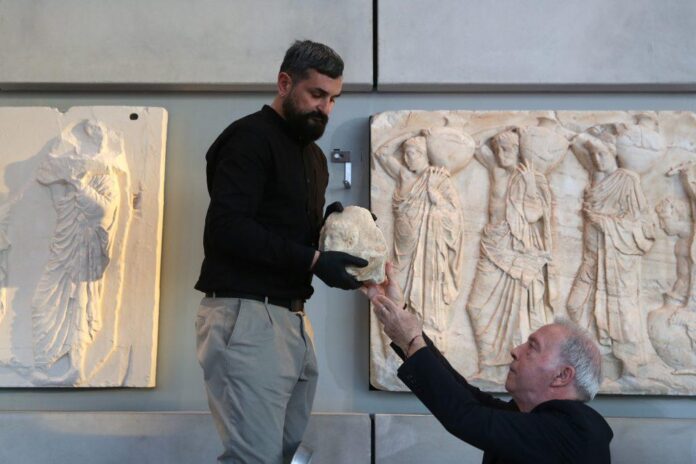Three sculpture fragments of the Parthenon marbles from the collection of the Vatican are back in Greece after a repatriation ceremony held Friday.
Pope Francis first discussed the works’ possible return during a 2021 visit to Athens, before announcing his decision to do so in December. The repatriation agreement was finalized earlier this month.
Carved some 2,500 years ago, the marbles originally adorned the 525-foot frieze on the Parthenon atop the Acropolis in Athens. But between 1801 and 1812, Thomas Bruce, known as Lord Elgin, controversially removed about half of the sculptures from the site and sold them to the British Museum in London, where they remain to this day. He claimed to have gotten permission from Ottoman officials, but the Greek government has been formally calling for their return since 1983, arguing that Elgin and his men looted the statues from the historic site.
The Vatican said that returning its marbles—a bearded man, a boy’s head, and a horse’s head—was a “donation” to Greece’s Orthodox Church and a “gesture of friendship,” reported the .

Bishop Brian Farrell, a Vatican secretary for promoting Christian unity (C) and Greece’s Orthodox Church Archbishop Ieronymos (L) attend a ceremony at the Acropolis Museum in Athens for the repatriation of three fragments from the Parthenon marbles. Photo: Angelos Tzortzinis/AFP via Getty Images.
“Initiatives like these show the way, how the pieces of the Parthenon can be reunited, healing the wounds caused by barbaric hands so many years ago,” Greek culture minister Lina Mendoni said at the ceremony. “This takes us to the just and moral demand of the entire Greek people, and of this government and its prime minister, for the final return of all the sculptures of the Parthenon.”
The fragments have entered the collection of the Acropolis Museum in Athens, which opened in 2009 with a dedicated Parthenon gallery for the display of the marbles in the same orientation as they would have been originally mounted on the building. The space, which has glass walls offering a view of the Acropolis, was constructed to rebut British insistence that the marbles could not be returned as Greece did have anywhere to safely exhibit them for the public. (The British Museum’s Parthenon galleries, meanwhile, have been plagued by leaks in recent years.)
The fate of the marbles at the British Museum remains a source of debate. After years of the U.K. refusing to consider repatriation—even under pressure from UNESCO—the two sides recently appeared to be getting close to striking a deal, especially after the museum was rocked by pro-restitution demonstrators in June.

Reunification ceremony for three Parthenon fragments from the Vatican Museum, at the Acropolis Museum in Athens Greece on March 24, 2023. Pope Francis donated the three fragments to the Archbishop Ieronymos. Photo: Costas Baltas/Anadolu Agency via Getty Images.
But after Greece rejected the U.K.’s proposal of a longterm loan of the marbles in January, progress in the negotiations appear to have stalled.
Earlier this month, U.K. Prime Minister Rishi Sunak stated that there were “no plans” to change 1963 British Museum Act which prevents public institutions such as the British Museum from selling or giving away objects in its collection—clearly a necessary step for Greece to secure the artworks’ permanent return.
In late 2021, the Museo Archeologico Antonio Salinas in Palermo, Sicily, agreed to a four-year loan of a frieze from the Parthenon marbles to the Acropolis Museum, in exchanged for the loan of a headless statue of Athena.

























